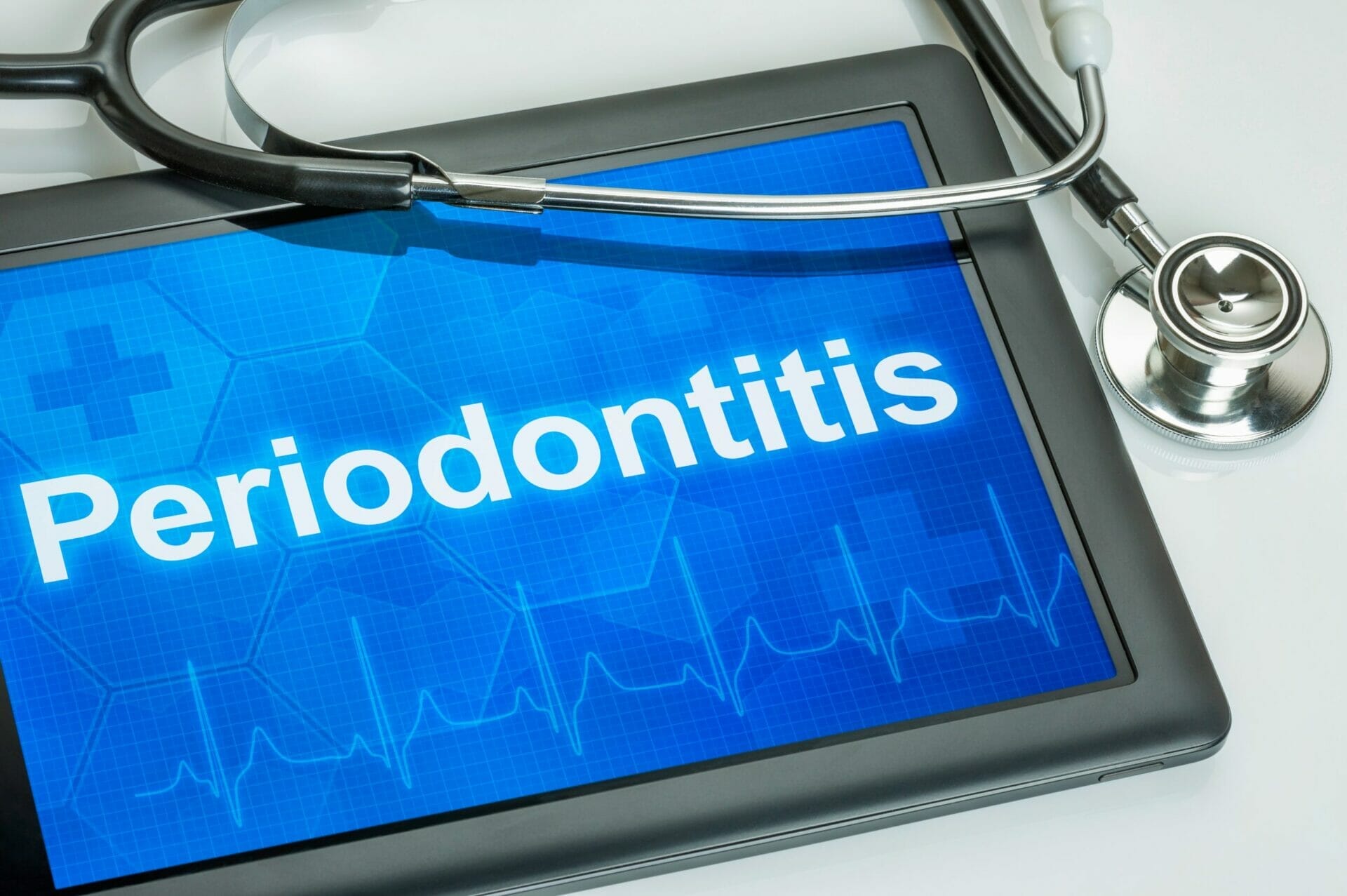
My name is Kyle Hornby and I am a Dentist in Kitchener, ON. Each week I tackle common dental topics to help you better understand how to raise the bar on your dental home care. My overall goal is to help patients to need less treatment so they can save money on annual dental fees. This week, I'd like to discuss Gum Disease while answering patients' most commonly asked questions.
Gum Disease, also know as Periodontitis, is a condition marked by an ongoing loss of gums and bone from around your teeth. Gum Disease is the #1 cause of tooth loss in adults, globally (yes, ahead of even tooth decay and cavities). The U.S. Center for Disease Control (CDC) reports that approximately 47% of individuals over the age of 30 suffer from some form of Gum Disease. They also note that Periodontitis increases with age such that 70% of adults over the age of 65 suffer from Gum Disease.
There are many factors that contribute to Gum Disease and I will review them below.
There are different forms of gum disease or Periodontitis and the root cause is different in each. Below, you'll find different forms of gum disease and their causes:
As an important note, some patients with poor oral hygiene and a mouth rife with plaque, calculus, and other contaminants may never progress from simple Gingivitis (inflammation of the gums without loss of gum and bone tissue) to Periodontitis. (This was confirmed in a landmark research paper found here.) This underscores the variable (and sometimes unpredictable) nature of Gum Disease.
The symptoms associated with Gum Disease can include pain, gum infection (or abscess) and tooth sensitivity. Pain commonly accompanies severe inflammation of gums and sometimes occurs in conjunction with gum infections. The infections will occur in patients with gum disease when food stagnates in deep gum pockets for long periods of time.
Tooth sensitivity to cold, heat, or sweet occurs commonly in Periodontitis patients because gum recession exposes the extremely sensitive roots of teeth.
In many cases of gum disease, however, there are no symptoms whatsoever. This is often the case in patients who lose the bone surrounding their tooth roots but maintain a normal gum level. When this occurs, it is difficult for patients to know that bone loss is occurring underneath an otherwise normal-looking surface.
The fact that the disease may not produce any symptoms or that it may be difficult to detect at home underscores the importance of frequent dental cleanings and checkups.
Gum disease looks different in different people. This can make it hard to notice for a patient checking out their teeth and gums at home. Bone loss is a hallmark of Periodontitis, but in some cases gum loss or recession doesn't occur. It makes perfect sense that if your gums stay at the same level over time, you'd assume things are pretty much okay. However, bone loss may be occurring beneath the surface completely undetected.
In the majority of cases, Gum Disease is more noticeable because gum loss occurs in conjunction with bone loss. These patients will note the progressive gum recession at their checkups. Additionally, most cases of Periodontitis come with inflammation and bleeding gums. Patients may also notice occasional gum abscesses or infections. A bad smell and/or taste in the mouth often accompany gum disease.
NOTE: Smoking causes a loss of blood and nutrition supply to the gums. In patients who smoke, Periodontitis will be harder to detect because the lack of blood supply means no inflammation or bleeding, and generally, the gums will look pink and healthy.

Yes. In cases where there is a root cause of Periodontitis, treatment can improve or eliminate the condition. Patients with Chronic Periodontitis will be able to slow or completely arrest its progression with a great oral home care routine and regular dental cleanings. In patients where systemic disease is a contributing factor, proper disease management will help to slow Periodontitis. For instance, we often see improvement in patients who begin to control their diabetes by improving blood sugar management.
In patients with Aggressive Periodontitis, there is incomplete evidence regarding treatment of the disease. Given that in AP, plaque and other contaminants are not a factor, it is a difficult condition to treat and control.
Unfortunately, Periodontitis is not reversible. Once you lose gum and bone tissue, it will not grow back or regenerate. Thus, the main goal of treatment is to slow or stop progression of the disease.
There is very little ability to rebuild gum and bone tissue using grafts. That is, positive outcomes occur only within a narrow range of conditions.
In some cases gum disease can cause pain but, generally, it's not painful. Pain will develop in conjunction with a gum infection which can come with swelling and draining pus, as well. Occasionally, inflammation is severe enough to cause pain but this is most noticeable during flossing. If the patient doesn't floss their teeth, they will tend to be fairly pain-free through the progression of their gum disease.
Gum disease is not contagious in the sense that you cannot infect another person. It is possible to transfer harmful bacteria during kissing but these bacteria will not thrive in a clean, healthy mouth. As long as the individual continues to have a clean mouth and maintains a good balance between helpful and harmful bacteria, they won't develop Periodontitis.
Harmful bacteria can, however, initiate gum disease in one area of the mouth and eventually spread to other sites in the same individual. This underscores the importance of catching local cases of Periodontitis early to prevent gum and bone loss in other parts of the mouth.
Unfortunately, it is difficult to be precise about treatment costs for gum disease. The reason is that treatment can involve only regular dental cleanings in some circumstances, or it may involve gum and bone grafting in others.
Costs also depends on patient comfort and priorities. Some patients may want to reverse gum recession with pricey connective tissue grafting. Others, in comparison, will be comfortable to simply halt progression of the disease.
Generally, a dental cleaning can range in cost from $100 - $300. Oftentimes, a patient with Periodontitis will require more frequent dental cleanings, on average. Whereas the average cleaning interval is 6 months, patients with gum disease typically have their dental cleanings every 3-4 months.
The higher frequency dental cleanings help patients to minimize the buildup of plaque, tartar and irritants that fuel the progression of Periodontitis.
Patients who pursue bone and gum grafting can be looking at fees in excess of $1,000 - $2,000 per tooth.
We've gone over gum disease and smoking briefly, above. We know that gum disease occurs at a higher rate in smokers and that it's tough to detect because the gums aren't inflamed and they don't bleed. However, we haven't discussed why smoking contributes to gum disease.
One reason why smoking can trigger gum disease is because of a loss in blood and nutrient supply to gums. Without these things, your gums don't heal or turnover at a rate that's consistent with good oral health. Another reason is that smoking changes the cells and enzymes your body produces. When turning over gum tissue, your body has cells and enzymes that do some "breaking down" and others that do some "building up". Smoking increases the production and action of the cells and enzymes that break down gum tissue and bone, causing a steady loss of both over time.
There certainly are habits and behaviours that can accelerate the bone loss and gum recession that comes with Periodontitis. These are the things you want to control or avoid if you're trying to stop the progression of gum disease. What are they?
SMOKING. As I mentioned above, smoking depletes the blood and nutrient supply within your gums. They don't heal as well. They don't turnover as well. If you're already battling gum disease, smoking will only make things worse. There is research demonstrating that smoking Cannabis also contributes to Periodontitis.
TOOTH GRINDING & CLENCHING. Daytime or nighttime clenching and grinding can cause bone loss and gum recession in the absence of harmful bacteria. That is, people with otherwise healthy gums and no active Periodontitis can lose bone and gum tissue because of their clenching and grinding. Now, add active gum into the mix and you have a recipe for rapid gum and bone loss. Grinding and clenching habits differ from smoking in that they often occur unconsciously or during sleep. In most cases, patients can't just decide to stop grinding their teeth. The best management solution is to wear a custom night guard that will cushion against and distribute harmful forces that can accelerate the progression of gum disease.

Scope, Listerine and other manufacturers offer mouth rinses to kill or disrupt oral bacteria. The problem with many of these products is that they harm many types of good bacteria within the mouth, too. Intuitively, we may think that a sterile mouth is a portrait of good oral health but this is not the case. We rely heavily on many strains of good bacteria to keep bad bacteria at a minimum, help digestion, and keep our oral immune system running at peak levels.
A more productive approach to tweaking bacteria levels in the mouth is through regular use of dental probiotics. These can be found at natural food stores, come in gum and lozenge form, and provide high concentrations of beneficial oral bacteria. Research has shown that some of the bacterial strains in these probiotics can help to fight Periodontitis or Gum Disease!
I think that one of the most unfortunate fallouts of having a separate healthcare provider deal with the mouth is that we all came to think of dental health and overall health as being independent or separate. This went on for a long time and represented one of the "blind spots" in how medical and dental healthcare providers viewed overall wellness.
In recent years, there has been a windfall of research showing links between oral health and overall wellness. Specifically, poor oral health has been shown to negatively influence many systemic illnesses including heart disease, Diabetes and Alzheimer's Disease (to name only a few).
There may be many ways through which gum disease affects overall health. One main mechanism involves harmful oral bacteria (that cause Periodontitis) moving to other parts of the body, where they cause inflammation and modify the body's immune function. Studies have identified oral bacteria in atherosclerotic plaques seen in patients with cardiovascular disease.
Gum disease is a common oral condition that affects a large percentage of our population. It is one of the leading causes of tooth loss. It can also cause pain, suffering and lead to worsening of systemic conditions like Diabetes and Heart Disease. The progression of the disease varies between individuals and it can be made worse by outside factors such as smoking and poor oral hygiene. It is important to detect Periodontitis early to halt it's progression and to minimize gum and bone loss.
By Dr. Kyle Hornby, Kitchener Dentist
Our Kitchener Dental Office is conveniently located in Downtown Kitchener. We are a short drive away for families in Waterloo, Breslau & St. Jacobs. Our central location means we truly offer family dentistry near you!
This article is not intended to be a substitute for professional advice, diagnosis, or treatment. Accordingly, always seek the advice of your Dentist or other healthcare providers regarding a dental condition or treatment.
